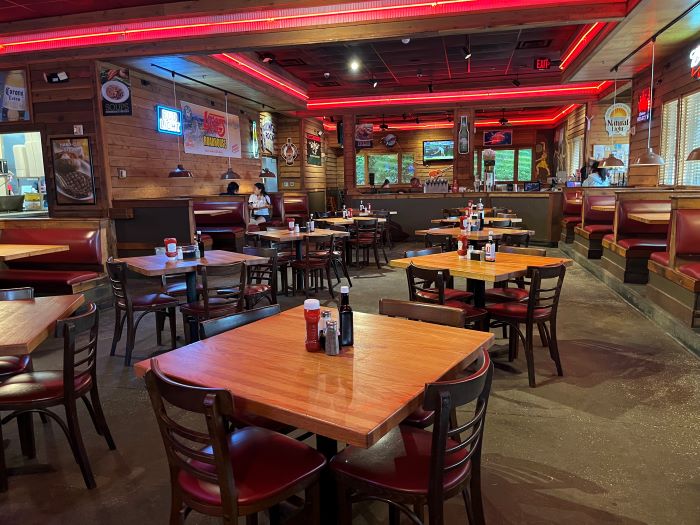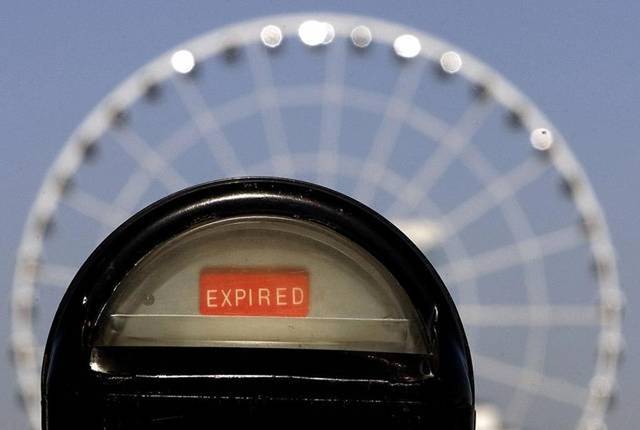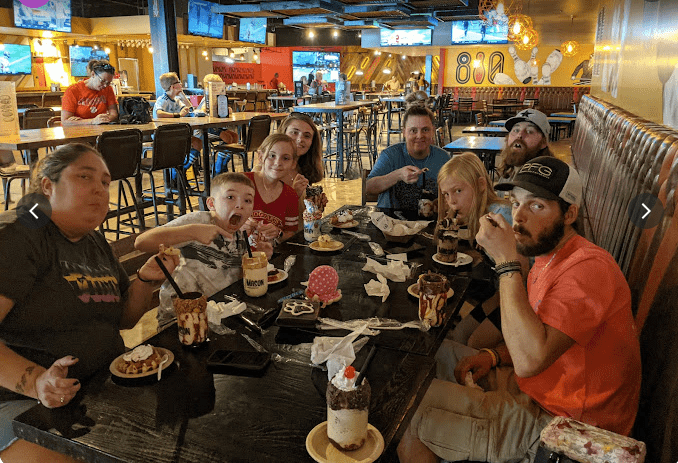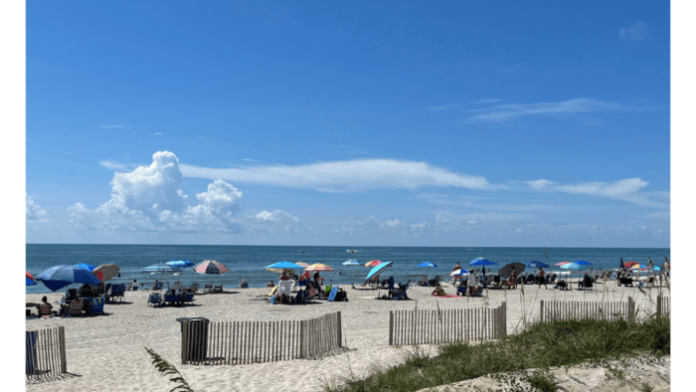We took the above picture today, July 27th at 11:27 a.m. from the Holiday Sands South on 25th Ave. South in downtown Myrtle Beach.
This is peak season in Myrtle Beach?
It’s true that gas prices have risen 27 cents this week, but sparse beachfront crowds have been ongoing all Summer. The MBACC says occupancy is only down 6%, however, what is not factored into their number are the deep discounting City of Myrtle Beach hotels are doing to sell last minute empty rooms. Hotel business is not the only measure of a healthy city economy, either.
Tourists who visit the city based on a low price point are less inclined to dine out.
We spoke with the waitstaff of multiple businesses over the past month including: The Olive Garden on 14th Ave North in Myrtle Beach, Logans Roadhouse on 1136 Oak Forest Ln, and Red Lobster on 1230 North Retail Court. All restaurants are located downtown Myrtle Beach and all stated that Summer 2023 business was the worst they could recall.

This, despite the Myrtle Beach Area Chamber of Commerce receiving over $51 million annually in tax subsidies to promote the city.
As is typical in the City of Myrtle Beach, many businesses, like The Tasting Room and The Dolly Llama (announced by the city as coming yesterday), participate in city sponsored, tax funded capitalism.
BUSINESS DOWN, BUT NOT EVERYWHERE
Our news team visited the Dead Dog Saloon in Murrells Inlet last night and experienced a 45 minute wait time at 5 p.m. All restaurants in Murrells Inlet we check in with had substantial wait times.
Surfside Beach is also extremely crowded, especially along the several high end campground resorts located in and near Surfside Beach.
Restaurant business is very down in the City of Myrtle Beach, however.
Does Myrtle Beach City Resident Taxpayer Sponsored Capitalism Work?
Myrtle Beach City residents are now among the largest private investors in the city. The city is spending over $200 million downtown. Resident taxpayers and city merchants are paying the tab. For merchants, their portion has an added mid tax above and beyond the regular taxes paid by these merchants.
All revenue related constructs appear to be focused on revenues the City of Myrtle Beach can collect from tourists. One key example is paid downtown parking.

Carolina Forest Merchants Do Much Better
Oddly enough, the Olive Garden located at 73 Rodeo Drive in Carolina Forest is doing much better than the Olive Garden in downtown Myrtle Beach, even during peak season. But why?
Carolina Forest has 50,000 local residents who are very brand loyal to the businesses they like.
The Olive Garden in downtown Myrtle Beach is located in an area that few residents in Market Common or the Dunes Club area visit. The two new taxpayer funded businesses the city announced as coming yesterday, are also located in the same general area as the downtown Olive Garden. Question: Can the new businesses survive there? Even with the tax giveaways, would those investors be wiser to locate in the Carolina Forest area?
About Government Sponsored Capitalism:
Government-sponsored capitalism, also known as state capitalism or mixed economy, is an economic system where the government plays a significant role in supporting and regulating the market. It combines elements of both capitalism and government intervention to ensure economic stability and promote public welfare.
The effectiveness of government-sponsored capitalism can vary depending on several factors, such as the specific policies implemented, the level of government involvement, and the overall governance of the country. Here are some points to consider:
1. Economic Stability: Government intervention can help stabilize the economy by implementing monetary and fiscal policies. For example, through controlling interest rates, taxation, and public spending, the government can manage inflation, unemployment, and economic growth.
2. Public Welfare: By actively participating in the economy, the government can ensure that basic needs, such as healthcare, education, and social security, are provided for all citizens. This helps reduce inequality and improve overall living standards.
3. Regulation and Fair Competition: Government oversight usually is lax and partner friendly, which creates monopolies like the Myrtle Beach Area Chamber of Commerce. The free market encourages fair competition, and protect consumers from unethical business practices. Regulatory agencies enforce laws and regulations ad hominem, most often protecting the interests of the city and city sponsored businesses.

4. Infrastructure Development: Government-sponsored capitalism often involves significant investments in infrastructure projects, such as transportation networks, utilities, and public facilities. These developments can enhance economic productivity, attract investments, and improve the quality of life for citizens.
5. Innovation and Research: Governments can also play a crucial role in promoting research and development, particularly in areas deemed critical for national development or security. By funding scientific research and offering incentives, governments can stimulate innovation and technological advancements. However, Government consistently proves to be behind the curve on innovation in those areas. Government data is subject to government interpretation, as viewed by government think inside of a closed loop bubble of tax paid bureaucrats.
However, it’s important to note that the success of government-sponsored capitalism relies heavily on effective governance, transparency, and accountability. When proper checks and balances are not in place, there is a risk of corruption, inefficiency, and unequal distribution of resources.
Ultimately, whether government-sponsored capitalism is effective or not depends on how well the government balances its interventions with market forces, respects private property rights, encourages entrepreneurial activity, and ensures a level playing field for businesses.
It is worth mentioning that opinions on this matter vary significantly, and different countries have implemented various models of government-sponsored capitalism with varying degrees of failure and success.
One major risk of government-sponsored capitalism is inefficiency. When the government becomes heavily involved in the economy, bureaucracy and red tape can slow down decision-making processes and hinder efficiency. This can lead to a less dynamic and innovative marketplace, ultimately hindering economic growth.
Additionally, government interference can also create a lack of competition and result in monopolies or oligopolies. When the government favors certain companies over others, it can stifle innovation and discourage new entrants into the market, limiting consumer choice and driving up prices.
Another challenge arises from the potential for corruption and political influence. In government-sponsored capitalism, there is a risk that powerful corporations could unduly influence politicians and policymakers, leading to regulations and policies that prioritize their own interests, rather than the welfare of the general public.
Furthermore, government-sponsored capitalism may struggle to strike a balance between social welfare and economic growth. Sometimes, governments prioritize short-term political gains over long-term economic stability, leading to policies that increase public debt or distort market mechanisms. This can create unsustainable economic conditions, potentially leading to economic crises.
For the most part, studies show Government Sponsored Capitalism is just as susceptible to fail as free market capitalism. The big difference: The Myrtle Beach city resident taxpayer, rather than an investor, picks up the tab when government sponsored businesses fail.
Trying to get a straight yes or no answer from a city bureaucrat or a private/public partner like Myrtle Beach Area Chamber C.E.O. Chamber President Karen Riordan is like trying to get a straight yes or no answer from the FBI, DOJ, or HHS at a House Oversight committee.
Ask them a simple question and you will likely get a 40 minute novel laced with a myriad of reasons explaining why they can’t be held accountable.


